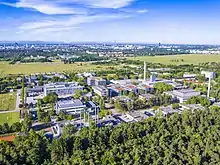Helmholtz Zentrum München German Research Center for Environmental Health | |
 Campus Helmholtz Munich | |
| Formation | 1960 |
|---|---|
| Legal status | GmbH |
| Location |
|
CEO | Prof. Dr. Matthias H. Tschöp |
CFO and CTO | Kerstin Günther |
Staff (2018) | 2546 |
| Website | www |
Helmholtz Zentrum München Deutsches Forschungszentrum für Gesundheit und Umwelt (GmbH), also known as Helmholtz Munich, is a member of the Helmholtz Association of German Research Centres. It was founded in 1960 and is a joint venture by the Federal Ministry of Education and Research and Bavarian State Ministry of Finance and Home.
Management
Prof. Dr. H. Matthias Tschöp has been the Scientific Director and chief executive officer of the Center since 2018. In 2019 Kerstin Günther joined the center and is now the Chief Financial and Technology Officer.
Campus
The main campus is located in Neuherberg, a district of Oberschleißheim, right outside of Munich’s city borders. The campus has a size of 52.3 hectares. In addition, the center maintains research facilities inside the city area of Munich, Augsburg, Tübingen, Hanover, Dresden and Leipzig.[1]
Legal form
Helmholtz Zentrum München is a limited liability company according to German law and is financed by a ratio of 90:10 by its two shareholders, the Federal Government and the Free State of Bavaria.
Research focus
The Center focuses its research on five key areas:
- Metabolic Health
- Environmental Health
- Molecular Targets and Therapies
- Cell Programming and Repair
- Bioengineering and Digital Health
Helmholtz Pioneer Campus (HPC)
HPC is where young investigators research in the fields of biomedical sciences, engineering and digitization in the research environment of Helmholtz Munich.[2]
Translational and clinical projects
Translational research approaches at the center are developed in cooperation with clinical partners:[3]
- Diabetes Study Center
- Comprehensive Pneumology Center
- Center of Allergy and Environment
Career development
The center has one Helmholtz Graduate School (HELENA) in cooperation with the Ludwig Maximilian University of Munich (LMU) and the Technical University Munich (TUM), and five Helmholtz Research Schools. The schools offer doctoral students in-depth research in the fields of diabetes, lung and radiation research, epigenetics and data science:
- Helmholtz Graduate School Environmental Health (HELENA)
- International Helmholtz Research School for Diabetes
- EpiCrossBorders: International Helmholtz-Edinburgh Research School for Epigenetics
- CPC-Research School Lung Biology and Disease
- Helmholtz Research School of Radiation Science
- Munich School for Data Science
References
- ↑ "Locations".
- ↑ "Home". pioneercampus.org.
- ↑ "Innovation & Translation".